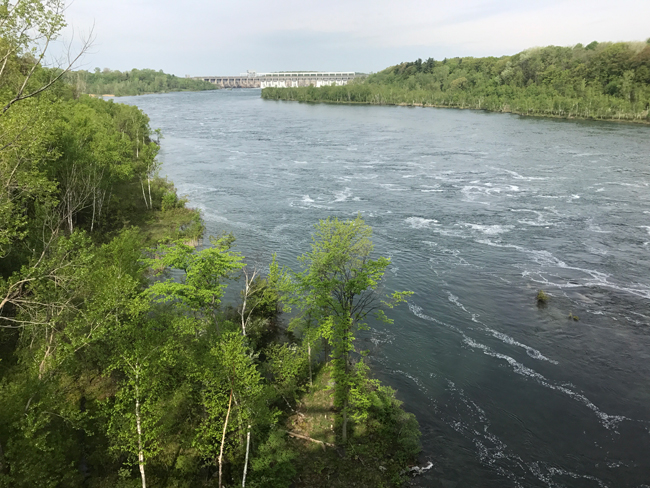As discussed on March 15th via Spectrum News Syracuse, New York Sea Grant Recreation and Tourism Specialist Dave White highlights how the coastal science program is partnering with the Department of Environmental Conservation to introduce the latest round of a new grant to increase eco-friendly recreation projects.
Eligible Projects Will Enhance Community and Ecosystem Resiliency and Capitalize on NY Water-Based Recreation and Tourism
March 19 Webinar for Applicants
Contacts:
Dave White, New York Sea Grant, Recreation and Tourism Specialist, P: 315-312- 3042, E: dgw9@cornell.edu
Kristen Davidson, New York State Department of Environmental Conservation, P: 716-851-7220, E: region9@dec.ny.gov
Ithaca, NY, March 6, 2018 - New York Sea Grant and New York State Department of Environmental Conservation (DEC) today announced $200,000 is available for Great Lakes ecosystem-based management projects through the New York Great Lakes Basin Small Grants Program, which is administered by New York Sea Grant in partnership with DEC. Up to $25,000 is available for each project.
“These grants support eco-based recreation and tourism projects and reinforce Governor Cuomo’s statewide efforts to connect more New Yorkers with the outdoors,” said DEC Commissioner Basil Seggos. “Not only do these grants protect our environment, they support recreation and tourism, major drivers of New York’s Great Lakes Basin economy.”
“These small grants create opportunities for stakeholders to build upon the unique natural strengths of their communities to enhance environmental quality, resiliency, and the economic benefits intrinsically tied to New York’s Great Lakes coastal resources,” said New York Sea Grant Associate Director and Cornell University Cooperative Extension Assistant Director Katherine Bunting-Howarth, Ithaca, N.Y.

In a previously-funded NY Small Grants Project,
Clarkson University investigators Michael Twiss and Joseph Skufca
focused on water quality monitoring issues in the St. Lawrence River. In
a June 2017 update, Twiss provided this view of the Long Sault dam with
its sliding lock gates opened to relieve high water levels on Lake
Ontario and the Upper St. Lawrence River. Due to abnormally high water
levels in the Great Lakes, discharge on the Upper St. Lawrence River was
more than double its normal rate. Credit: Michael Twiss, Clarkson University
Application instructions are online at www.nyseagrant.org/proposals. Proposals must be submitted by 4:30 p.m. EST on May 1, 2018. A webinar to help applicants will be held March 19 at 10 a.m. For more information, contact New York Sea Grant at 315-312-3042.
Proposed projects must use a complete ecosystem-based approach rather than a single issue or single species focus, incorporate stakeholder participation, and address key priorities in the New York Great Lakes Action Agenda. Those priorities include enhancing community resiliency and ecosystem integrity through restoration, protection, and improved resource management; and enhancing recreation and tourism opportunities that capitalize on the rivers and lakes, scenic beauty, and natural and cultural resources that define the character of the Great Lakes-St. Lawrence region.
Eligible projects may include planning, design, implementation, information management tool development, demonstration projects, and targeted educational outreach.
Not-for-profit organizations, county and local government or public agencies, municipalities, regional planning and environmental commissions, and educational institutions, including, but not limited to, public and private K-12 schools, colleges, and universities are eligible to apply.
The New York Great Lakes Basin Small Grants Program is funded through the New York State Environmental Protection Fund and Article 14 of Environmental Conservation Law.
On March 6th, NYSG Recreation and Tourism Specialist Dave White spoke on WWNY TV, a Fox affiliate in downtown Watertown that broadcasts the 6:30-7 am stretch of its channel 7 News This Morning program to around 10,000 viewers in New York's Jefferson and Northern Oswego Counties.
More Info: New York Sea Grant
New York Sea Grant (NYSG), a cooperative program of Cornell University
and the State University of New York, is one of 33 university-based
programs under the National Oceanic and Atmospheric Administration’s
National Sea Grant College Program.
Since 1971, NYSG has represented a statewide network of integrated
research, education and extension services promoting coastal community
economic vitality, environmental sustainability and citizen awareness
and understanding about the State’s marine and Great Lakes resources.
Through NYSG’s efforts, the combined talents of university scientists
and extension specialists help develop and transfer science-based
information to many coastal user groups—businesses and industries,
federal, state and local government decision-makers and agency managers,
educators, the media and the interested public.
The program maintains Great Lakes offices at Cornell University, SUNY
Buffalo, SUNY Oswego and the Wayne County Cooperative Extension office
in Newark. In the State's marine waters, NYSG has offices at Stony Brook
University in Long Island, Brooklyn College and Cornell Cooperative
Extension in NYC and Kingston in the Hudson Valley.
For updates on Sea Grant activities: www.nyseagrant.org has RSS, Facebook, Twitter, and YouTube links. NYSG produces a monthly e-newsletter, "NOAA Sea Grant's Social Media Review," via its blog, www.nyseagrant.org/blog. Our program also offers a free e-list sign up via www.nyseagrant.org/coastlines for its flagship publication, NY Coastlines/Currents, which is published quarterly.